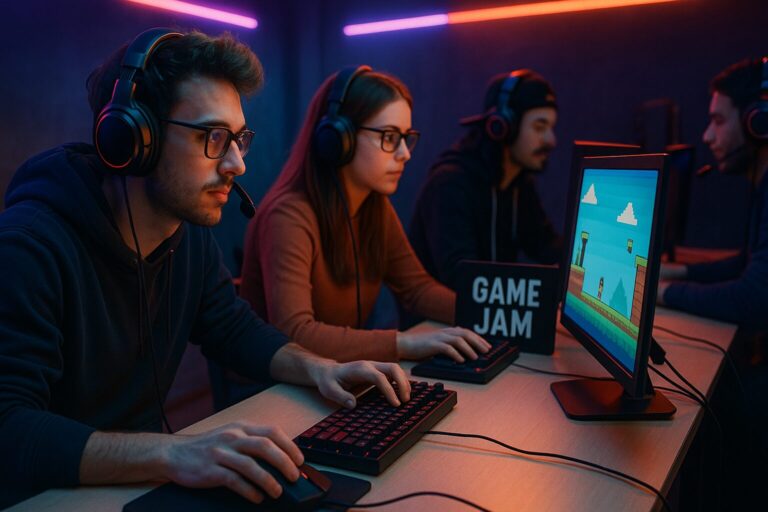
From Zero to a Playable Build—What to Learn and Where to Begin
Starting your first game project can feel overwhelming. There’s code to learn, art to make, tools to choose, and ideas flying in every direction. But the key to success is simple: start small, stay focused, and use the right resources.
This guide breaks it down step by step—and includes links to help you learn game development, programming, and 3D modeling, even if you’re starting from zero.
Step 1: Pick a Simple Game Idea
Before you write a line of code or open a game engine, decide what you’re building. It should be small, clear, and achievable.
Good first game ideas:
- A basic 2D platformer (jump over gaps and reach the exit)
- A top-down maze (find the key and unlock a door)
- A match-three puzzle (match colored tiles to score points)
- A clicker or idle game (click to earn points, upgrade to earn more)
Important: Your goal is not to make the next big hit. It’s to finish something playable and learn from the process.
Step 2: Choose Your Game Engine
Your game engine is where you’ll build your game. Choose one that matches your skill level.
Recommended beginner engines:
- Godot – Free, open source, beginner-friendly; uses GDScript (similar to Python)
- Unity – Industry standard, massive community, lots of tutorials; uses C#
- Unreal Engine – High-end 3D visuals; Blueprints system lets you build without code
- Construct 3 – Drag-and-drop, web-based; no code needed
For most first-time developers, Godot or Construct are great places to start.
Step 3: Learn the Basics of Coding
Even if your engine has visual tools, learning some programming will make everything easier. You don’t need to become an expert—just enough to understand logic and structure.
Free beginner-friendly programming resources:
- CS50’s Introduction to Computer Science – Harvard’s free intro course
- freeCodeCamp – Hands-on coding lessons, including JavaScript and Python
- W3Schools – Quick, readable coding references
- Godot Docs – GDScript Basics
Focus on the following concepts:
- Variables
- Functions
- If/else statements
- Loops
- Events and inputs
Start by modifying simple game templates. Then try building one from scratch using what you’ve learned.
Step 4: Learn the Basics of 2D or 3D Art
You don’t need to be an artist, but having control over basic visuals helps a lot—especially when customizing your game.
For 2D art:
- Piskel – Free pixel art editor in your browser
- Aseprite – Paid but powerful pixel animation tool
- Krita – Open-source digital painting app
For 3D modeling:
- Blender – Free, powerful 3D modeling and animation software
- Blender Guru’s Beginner Tutorial – Start-to-finish Blender intro
- CG Boost’s Blender Launch Pad – Paid but highly beginner-focused course
- Grant Abbitt YouTube Channel – Excellent free Blender tutorials for game devs
Tip: Start by editing existing assets. Then slowly build your own.
Step 5: Plan Your Game on Paper
Don’t jump into development blind. Planning helps you stay on track and avoid burnout.
Answer these questions:
- What’s the core gameplay?
- What does the player do?
- How does the game end?
- What do I need to build first?
Sketch out levels or menus if needed. You don’t need a full design document—just enough to stay organized.
Step 6: Build a Prototype
Now it’s time to start building. Focus only on the core gameplay loop—the one thing your game is about.
For example:
- In a platformer: get the movement and jumping working
- In a shooter: get bullets to spawn and hit a target
- In a puzzle game: get tile matching to work
Don’t worry about:
- Art quality
- Sound effects
- Menus or settings
Make a rough version of your game that works. This is your prototype. Keep it ugly. Keep it simple.
Step 7: Add Art, Sound, and UI
Once your prototype is working:
- Replace placeholder art with basic graphics
- Add sound effects and music
- Create a title screen or level selector
Use free assets if needed:
- Kenney.nl – Clean, high-quality game assets
- OpenGameArt.org – Wide variety of free art, music, and sound
- Freesound.org – Free community sound effects
Keep visuals consistent. You don’t need perfect art—just make sure it’s readable and fits the theme.
Step 8: Playtest and Polish
Have friends or strangers test your game. Don’t explain it—just watch them play. See where they get confused, stuck, or frustrated.
Then:
- Fix bugs
- Adjust difficulty
- Add visual or sound feedback
- Make controls smoother
Polish the game until it feels solid, not perfect.
Step 9: Finish and Release It
This is the most important step: finish the damn thing.
Export your game and share it:
- Itch.io – The best place to upload your first game
- Newgrounds – Good for browser games
- Game Jolt – Great for indie exposure
Write a short description. Include screenshots or a short trailer if possible. Even if only a few people play it, you’ve accomplished something big.
Bonus: Stay Connected and Keep Learning
Game development is a skill you build over time. Surround yourself with people who are doing the same.
Communities to join:
- r/gamedev – Beginner to advanced discussion
- Godot Q&A – Specific help for Godot users
- Unity Forum – Official Unity support and advice
- Blender Artists – 3D modeling help and inspiration
Keep making small games. Each one teaches you something new.
Final Thoughts
You don’t need to be a genius or a pro to start your first game. All you need is a simple idea, the right tools, and the willingness to learn.
Start with something you can finish. Focus on learning, not perfection. And remember—every developer starts exactly where you are right now.






